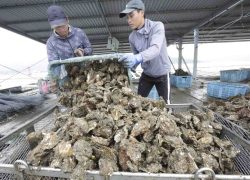15:13 JST, December 30, 2021
About 12,000 companies in Japan will be obliged, in as early as 2023, to draw up targets regarding their adoption of renewable energy, according to a policy the government has formulated.
The aim of the policy is to encourage companies to use more clean energy in place of fossil fuels and give a boost to their efforts toward decarbonization.
All companies that consume energy equivalent to at least 1,500 kiloliters of crude oil annually will be subject to the policy. The government will submit to the ordinary Diet session that starts in January a bill to revise the Law on the Rational Use of Energy, aiming to have the revised law put into force as early as in the spring of 2023.
In parallel with deliberations on the bill in the Diet, a council of the Economy, Trade and Industry Ministry will work out related rules in detail.
Following the revision, it will become necessary for target companies to set targets including those showing the ratio of renewable energy to the total amount of energy used at their factories and offices. These companies will have to submit a report to the government once a year to explain their efforts to use renewable energy that does not emit carbon dioxide, such as solar power.
If the government concludes that the efforts made by a company are insufficient, it will conduct on-site inspections or give guidance on how to improve. It will also establish punishments such as making public the company’s name or imposing penalties in case of noncompliance.
In calculating the use of energy, the government will also rate highly such efforts to be made by companies as staggering the peak hours of their electricity use. When electricity is consumed during times when there is some latitude in the supply of renewable energy, companies will be able calculate their use of electricity as being lower than usual. On the other hand, they will have to calculate the use of electricity higher than usual during periods when the supply situation is tight.
The current law makes it necessary for companies to draw up mid- and long-term plans regarding energy conservation, but has not laid down any stipulations as to the ratio on the use of renewable energy.
According to the latest policy, target companies will be assessed in four ranks in accordance with the achievements made. When a large company is assessed as being at the highest rank, it will be able to apply for a relevant subsidy.
Top Articles in Science & Nature
-

Japan Institute to Use Domestic Commercial Optical Lattice Clock to Set Japan Standard Time
-

Japan to Face Shortfall of 3.39 Million Workers in AI, Robotics in 2040; Clerical Workers Seen to Be in Surplus
-

Record 700 Startups to Gather at SusHi Tech Tokyo in April; Event Will Center on Themes Like Artificial Intelligence and Robotics
-

iPS Treatments Pass Key Milestone, but Broader Applications Far from Guaranteed
-

iPS Cell Products for Parkinson’s, Heart Disease OK’d for Commercialization by Japan Health Ministry Panel
JN ACCESS RANKING
-

Japan PM Takaichi’s Cabinet Resigns en Masse
-

Japan Institute to Use Domestic Commercial Optical Lattice Clock to Set Japan Standard Time
-

Israeli Ambassador to Japan Speaks about Japan’s Role in the Reconstruction of Gaza
-

Man Infected with Measles Reportedly Dined at Restaurant in Tokyo Station
-

Videos Plagiarized, Reposted with False Subtitles Claiming ‘Ryukyu Belongs to China’; Anti-China False Information Also Posted in Japan
























